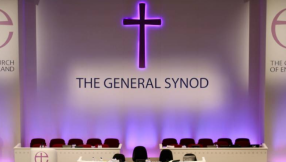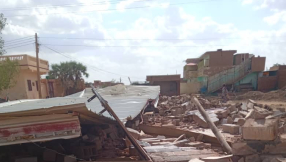U.S. approves latest North Korea nuclear agreement
"We have conveyed to the Chinese government our approval for the draft statement," State Department spokesman Sean McCormack told reporters.
Separately, the top U.S. negotiator with North Korea said he expected China to announce the deal, hammered out over the weekend in talks among the two Koreas, China, Japan, Russia and the United States, in the next day or two.
If approved by all six parties and carried out by North Korea, the agreement would mark a step toward the U.S. goal of getting North Korea to abandon all its nuclear weapons and atomic programs.
The secretive, Stalinist state detonated a nuclear device nearly a year ago and U.S. officials believe it has enough plutonium to make at least eight or nine nuclear bombs, which could threaten South Korea and Japan.
Those two countries were also unsettled when Washington disclosed in 2002 it believed Pyongyang also had a uranium enrichment program that could provide a second path to an atomic bomb.
Speaking at the United Nations, North Korean Vice Foreign Minister Choe Su-hon stressed the importance his country placed on operations at Yongbyon. He told the General Assembly it was "a courageous political decision to halt their operation and now enter the stage of disabling them for eventual dismantlement."
Choe said implementing the agreement "rests with every single party fulfilling its own obligations" and repeated Pyongyang's long-standing demand that Japan and the United States drop their "hostile policies" toward his country.
ANALYSTS DOUBTFUL
Many analysts are skeptical North Korea will ever fully abandon all nuclear weapons and existing nuclear programs as it promised in a September 2005 six-party agreement.
However, U.S. Assistant Secretary of State Chris Hill told reporters he hoped by year-end to see Yongbyon disabled and to have a full declaration of its nuclear programs, including how much fissile material it has, as well as "a very clear situation on the uranium enrichment."
Hill, the chief U.S. negotiator with North Korea, briefed U.S. President George W. Bush on Tuesday.
The U.S. belief that North Korea has a uranium enrichment program sparked the latest nuclear crisis with Pyongyang in 2002. At the time, Washington said North Korean officials had acknowledged the program but Pyongyang has since denied it.
Hill, however, suggested that the two sides were making some headway.
"We have had, I think, some intensive and productive discussions on ... the issue of resolving our concerns about uranium enrichment," Hill told reporters in New York.
Mike Green, an analyst at the CSIS think tank who previously worked on the North Korea issue at the White House, said he suspected North Korea would take gradual steps toward disabling the facilities rather than doing it all at once.
"It's unlikely they will do one, large disablement step. It's more likely that they will salami slice it but the process could be well under way," he said.
Wendy Sherman, a senior negotiator with the North Koreans during the Clinton administration, said Washington's challenge was "getting North Korea to declare their nuclear programs in a way that creates confidence that we can verify in some fashion with technical means or direct visits."













